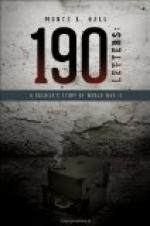Then, in the under-perspective so cleverly used by my dear painters with their air of simplicity, a road, unwinding itself, with its slopes and hills, bound in by shrubs, and some solitary trees: all this precise, fine, etched, and yet softened. A little bridge spanning a stream, a man on horseback passing close to the little bridge, carefully silhouetted, and then a little carriage: delicate balance of values, discreet, yet well maintained—all this in front of a horizon of noble woods. A kind of grey weather which has replaced the enchantment, so modern in feeling, of the nuances of last Sunday, takes me back to that incisive consciousness which moves us as a Breughel and the other masters, whose names escape me. Like this, too, the clear and orderly thronging in Albert Duerer backgrounds.
November 26.
DEAREST MOTHER,—I didn’t succeed in finishing this letter yesterday. We were very busy. And now to-day it is still dark. From my dug-out, where I have just arrived in the front line, I send you my great love; I am very happy. I feel that the work I am to do in future is taking shape in myself. What does it matter if Providence does not allow me to bring it to light? I have firm hope, and above all I have confidence in eternal justice, however it may surprise our human ideas. . . .
November 28.
The position we occupy is 45 metres away from the enemy. The roads of approach are curious and even picturesque in their harshness, emphasised by the greyness of the weather.
Our troops, having dodged by night the enemy’s vigilance, and come up from the valley to the mid-heights where the rising ground protects them from the infantry fire, find shelters hollowed from the side of the hill, burrows where those who are not on guard can have some sleep and the warmth of an Improvised hearth. Then, farther on, just where the landscape becomes magnificent in freedom, expanse, and light, the winding furrow, called the communication trench, begins. Concealed thus, we arrive in the trench, and it is truly a spectacle of war, severe and not without grandeur—this long passage which has a grey sky for ceiling, and in which the floor is covered over with recent snow. Here the last infantry units are stationed—units, generally, of feeble effective. The enemy is not more than a hundred metres away. From there continues the communication trench, more and more deep and winding, in which I feel anew the emotion I always get from contact with newly turned earth. The excavating for the banking-up works stirs something in me: it is as if the energy of this disembowelled earth took hold of me and told me the history of life.
Two or three sappers are at work lengthening the hollows, watched by the Germans who, from point to point, can snipe the insufficiently protected places. At this end the last sentry guards about forty metres.
You can picture the contrast between all this military organisation and the peace that used to reign here. Think what an astonishment it is to me to remember that where I now look the labourer once walked behind his plough, and that the sun, whose glory I contemplate as a prisoner contemplates liberty, shone upon him freely on these heights.




